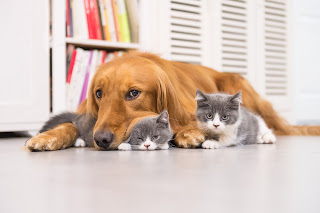Two cats and a dog in the US have tested positive for COVID 19- what does this mean??

Last week, we learned that two cats in different areas of New York tested positive for COVID 19 – then this week we learned that a pug in North Carolina tested positive as well. Many people are understandably wondering what this means for them and their pets. We’re here to help break down what we know so far and help guide you through this.
• How many pets have been affected by COVID 19 so far?◦ While the news seems to be mentioning new cases all the time, to date (as of 4-29-20) we have SIX total confirmed pets in the world with COVID 19! Compared to the millions of human cases, this is a very small number. The six include: 2 dogs and a cat in Hong Kong, and now 2 cats and a dog in the US. There was also a cat in Belgium, but there are questions regarding the testing methods and its possible the cat may have been suffering from another illness.
• What happened to those COVID 19 positive pets?◦ Of the Hong Kong animals, all three of them never showed signs of respiratory disease; they were only tested because their owners were positive. One of the Hong Kong dogs did pass away after being released from quarantine, but the dog was 17 and had ongoing health issues prior to testing positive. The cat in Belgium made a full recovery from possible COVID 19. The dog in North Carolina showed only mild signs for a few days and is now recovered. The New York cats are also expected to make a full recovery.
• What might COVID 19 look like in a house cat?◦ In the case of the 2 New York cats, they had mild respiratory signs. While not explicitly stated, this might look like coughing, nasal discharge, or increased respiratory effort. Remember that any noticeable respiratory changes are cause for seeking vet attention ASAP. There are many other causes of respiratory disease and your vet will help you decide next steps for your pet.
• What signs did the owners notice in the North Carolina dog that tested positive?◦ It is important to note that this dog was tested as part of a study out of Duke University, not because he was showing clinical signs. As part of the study, they tested all members of the household (the mom was a doctor, the dad worked in an ER, and they had 2 children), as well as their 4 pets (2 dogs, a cat and a lizard). Three of the humans tested positive (mom, dad, and one child), but only one animal tested positive (their pug, Winston). The family noted he did seem to be “gagging” for a couple of days and his appetite was down, but he has since recovered.
• Do we need to get our pets tested for COVID?◦ Routine testing for COVID 19 in pets is not available or recommended at this time. If you believe your pet is suffering from COVID 19, you should seek vet attention and they can contact authorities to authorize testing once more common issues have been ruled out.
• Where did these pets get COVID 19 from?◦ In the case of the Hong Kong pets, they were all in the care of someone with confirmed COVID 19. It was recommended that the pets be put into quarantine when the owners tested positive, and that was where the testing was done. One US cat was in the care of a COVID 19 infected person, but the other had no known contact with anyone symptomatic for COVID 19. This means that it was likely passed to the cat by an asymptomatic carrier.
• Do I have to worry about getting COVID 19 from my cat or dog?◦ The answer is very likely no! There is no proof that pets are spreading COVID 19 to humans; more likely, humans are spreading it to pets. Some important things to consider:▪ Keep your cat inside to prevent them from interacting with people and animals outside the home▪ Keep your dog on a leash when walking and maintain 6 feet distance from other people and animals▪ Avoid public places like dog parks
• Do I need to worry about giving my pet COVID 19?◦ The short answer is possibly, however before you panic, remember that good hygiene practices will make this extremely unlikely. There is no evidence that an animal should be removed from the home of a person infected with COVID 19 unless it poses a risk to the pet (i.e. you are too sick to care for your pet). Try to have someone else care for your pet if you become infected. If that is not possible, then wear a face mask when interacting with your pet, wash your hands before and after, and avoid close contact (no hugs, snuggles, etc).
Written By: Dr. Erin Walsh, Companion Animal Hospital Mount ProspectSources:https://www.avma.org/resources-tools/animal-health-and-welfare/covid-19/sars-cov-2-animals-including-petshttps://www.cdc.gov/media/releases/2020/s0422-covid-19-cats-NYC.htmlhttps://www.wral.com/coronavirus/pug-with-coronavirus-first-dog/19074499/
